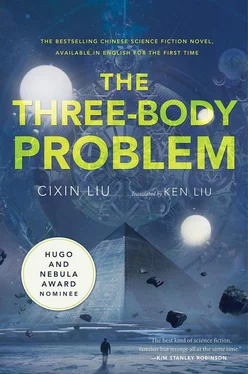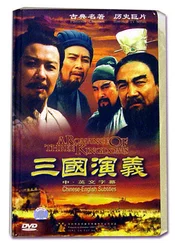A cackling laugh broke the silence. The sound came from Shao Lin, whose mind had finally broken. The laughter frightened the attendees, who began to leave the struggle session, first in trickles, and then in a flood. The exercise grounds soon emptied, leaving only one young woman below the stage.
She was Ye Wenjie, Ye Zhetai’s daughter.
As the four girls were taking her father’s life, she had tried to rush onto the stage. But two old university janitors held her down and whispered into her ear that she would lose her own life if she went. The mass struggle session had turned into a scene of madness, and her appearance would only incite more violence. She had screamed and screamed, but she had been drowned out by the frenzied waves of slogans and cheers.
When it was finally quiet again, she was no longer capable of making any sound. She stared at her father’s lifeless body, and the thoughts she could not voice dissolved into her blood, where they would stay with her for the rest of her life. After the crowd dispersed, she remained like a stone statue, her body and limbs in the positions they were in when the two old janitors had held her back.
After a long time, she finally let her arms down, walked slowly onto the stage, sat next to her father’s body, and held one of his already-cold hands, her eyes staring emptily into the distance. When they finally came to carry away the body, she took something from her pocket and put it into her father’s hand: his pipe.
Wenjie quietly left the exercise grounds, empty save for the trash left by the crowd, and headed home. When she reached the foot of the faculty housing apartment building, she heard peals of crazy laughter coming out of the second-floor window of her home. That was the woman she had once called mother.
Wenjie turned around, not caring where her feet would carry her.
Finally, she found herself at the door of Professor Ruan Wen. Throughout the four years of Wenjie’s college life, Professor Ruan had been her advisor and her closest friend. During the two years after that, when Wenjie had been a graduate student in the Astrophysics Department, and through the subsequent chaos of the Cultural Revolution, Professor Ruan remained her closest confidante, other than her father.
Ruan had studied at Cambridge University, and her home had once fascinated Wenjie: refined books, paintings, and records brought back from Europe; a piano; a set of European-style pipes arranged on a delicate wooden stand, some made from Mediterranean briar, some from Turkish meerschaum. Each of them seemed suffused with the wisdom of the man who had once held the bowl in his hand or clamped the stem between his teeth, deep in thought, though Ruan had never mentioned the man’s name. The pipe that had belonged to Wenjie’s father had in fact been a gift from Ruan.
This elegant, warm home had once been a safe harbor for Wenjie when she needed to escape the storms of the larger world, but that was before Ruan’s home had been searched and her possessions seized by the Red Guards. Like Wenjie’s father, Ruan had suffered greatly during the Cultural Revolution. During her struggle sessions, the Red Guards had hung a pair of high heels around her neck and streaked her face with lipstick to show how she had lived the corrupt lifestyle of a capitalist.
Wenjie pushed open the door to Ruan’s home, and she saw that the chaos left by the Red Guards had been cleaned up: The torn oil paintings had been glued back together and rehung on the walls; the toppled piano had been set upright and wiped clean, though it was broken and could no longer be played; the few books left behind had been put back neatly on the shelf….
Ruan was sitting on the chair before her desk, her eyes closed. Wenjie stood next to Ruan and gently caressed her professor’s forehead, face, and hands—all cold. Wenjie had noticed the empty sleeping pill bottle on the desk as soon as she came in.
She stood there for a while, silent. Then she turned and walked away. She could no longer feel grief. She was now like a Geiger counter that had been subjected to too much radiation, no longer capable of giving any reaction, noiselessly displaying a reading of zero.
But as she was about to leave Ruan’s home, Wenjie turned around for a final look. She noticed that Professor Ruan had put on makeup. She was wearing a light coat of lipstick and a pair of high heels.
Two years later, the Greater Khingan Mountains
“Tim-ber…”
Following the loud chant, a large Dahurian larch, thick as the columns of the Parthenon, fell with a thump, and Ye Wenjie felt the earth quake.
She picked up her ax and saw and began to clear the branches from the trunk. Every time she did this, she felt as though she were cleaning the corpse of a giant. Sometimes she even imagined the giant was her father. The feelings from that terrible night two years ago when she cleaned her father’s body in the mortuary would resurface, and the splits and cracks in the larch bark seemed to turn into the old scars and new wounds covering her father.
Over one hundred thousand people from the six divisions and forty-one regiments of the Inner Mongolia Production and Construction Corps were scattered among the vast forests and grasslands. When they first left the cities and arrived at this unfamiliar wilderness, many of the corps’ “educated youths”—young college students who no longer had schools to go to—had cherished a romantic wish: When the tank clusters of the Soviet Revisionist Imperialists rolled over the Sino-Mongolian border, they would arm themselves and make their own bodies the first barrier in the Republic’s defense. Indeed, this expectation was one of the strategic considerations motivating the creation of the Production and Construction Corps.
But the war they craved was like a mountain at the other end of the grassland: clearly visible, but as far away as a mirage. So they had to content themselves with clearing fields, grazing animals, and chopping down trees.
Soon, the young men and women who had once expended their youthful energy on tours to the holy sites of the Chinese Revolution discovered that, compared to the huge sky and open air of Inner Mongolia, the biggest cities in China’s interior were nothing more than sheep pens. Stuck in the middle of the cold, endless expanse of forests and grasslands, their burning ardor was meaningless. Even if they spilled all of their blood, it would cool faster than a pile of cow dung, and not be as useful. But burning was their fate; they were the generation meant to be consumed by fire. And so, under their chain saws, vast seas of forests turned into barren ridges and denuded hills. Under their tractors and combine harvesters, vast tracts of grasslands became grain fields, then deserts.
Ye Wenjie could only describe the deforestation that she witnessed as madness. The tall Dahurian larch, the evergreen Scots pine, the slim and straight white birch, the cloud-piercing Korean aspen, the aromatic Siberian fir, along with black birch, oak, mountain elm, Chosenia arbutifolia —whatever they laid eyes on, they cut down. Her company wielded hundreds of chain saws like a swarm of steel locusts, and after they passed, only stumps were left.
The fallen Dahurian larch, now bereft of branches, was ready to be taken away by tractor. Ye gently caressed the freshly exposed cross section of the felled trunk. She did this often, as though such surfaces were giant wounds, as though she could feel the tree’s pain. Suddenly, she saw another hand lightly stroking the matching surface of the stump a few feet away. The tremors in that hand revealed a heart that resonated with hers. Though the hand was pale, she could tell it belonged to a man.
Читать дальше












